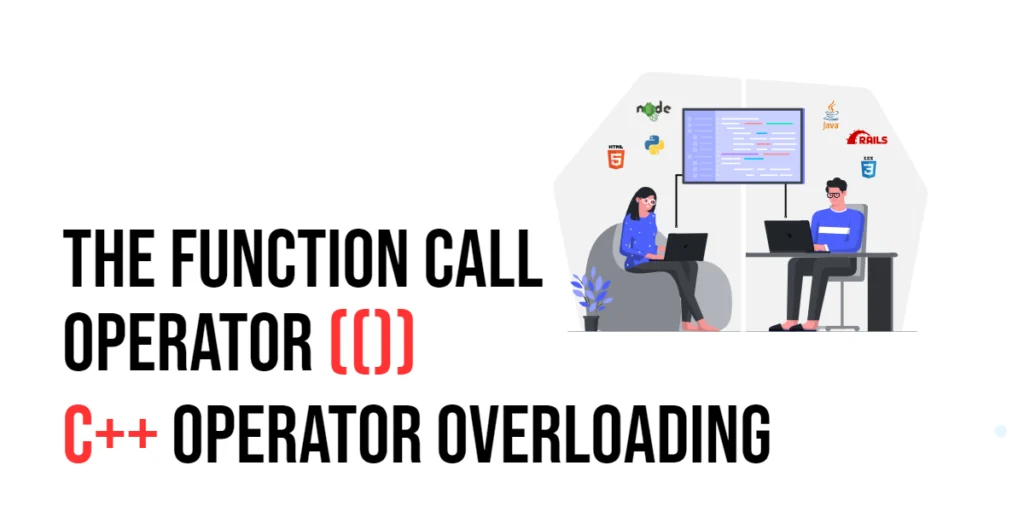Operator overloading in C++ is a fascinating feature that lets programmers enhance how their custom types interact, making these interactions feel as natural as those with built-in types like integers or strings. Among the many operators you can overload, the function call operator () stands out due to its unique ability to turn objects into “callable” entities, almost like functions. This article will delve into the nuances of overloading this operator, explain why it might be useful, and provide detailed examples to illustrate its various uses. Whether you’re looking to simplify complex code or introduce new functionality into your classes, mastering this operator can significantly enrich your programming toolkit.
What is Operator Overloading?
In the world of C++, the symbols such as +, -, *, and / are not just limited to adding, subtracting, multiplying, and dividing numbers like integers and doubles. These symbols, known as operators, can be customized to work in unique ways with user-created types through a process known as operator overloading. This customization enhances the readability and efficiency of the code. For instance, overloading the + operator for a String class could allow you to seamlessly combine two strings with the + symbol, just as effortlessly as you would add two numbers.
The Function Call Operator ()
A particularly intriguing operator is the function call operator (), which can be overloaded to make an instance of a class act almost like a mini-function. This means you can craft objects that you can “call” to perform actions, similar to calling a function. Overloading this operator unlocks various possibilities, such as creating functor classes or classes that mimic other functional behaviors, providing a powerful tool in C++ programming.
Why Overload the Function Call Operator?
There are several compelling reasons to overload the function call operator:
- Creating Functor Classes: Imagine objects that can act as functions—these are known as functors. Functors are particularly valuable when you need an object that behaves like a function but also needs to maintain some internal state or be configurable.
- Implementing Callback Mechanisms: In programming, callbacks are essential for algorithms or functions that need to call back some specific functionality. By making objects that behave like functions, you can pass these objects into other parts of your code that expect something callable, enhancing flexibility.
- Simplifying Usage of Complex Classes: Sometimes, a class is designed to perform a specific complex action predominantly. Overloading the function call operator in such classes can simplify how they are used, making the interaction with them more intuitive and straightforward.
By leveraging operator overloading, specifically the function call operator, programmers can significantly enrich the functionality and usability of their C++ code, making it not just more powerful but also more expressive. This technique opens up a spectrum of creative programming possibilities that can make your code both fun to write and easy to understand.
Example 1: A Simple Functor – Doubling a Number
Imagine you want to create a small tool that doubles a number. Instead of writing a full function each time, you can make your tool using a class in C++ that acts like a function. This is known as a “functor” (function object). Here’s how you can create a simple functor to double a number:
#include <iostream>
// Define a class called Doubler
class Doubler {
public:
// Overload the function call operator ()
int operator()(int x) const {
return 2 * x; // Whatever integer you pass into this, it returns twice that value.
}
};
int main() {
Doubler dbl; // Create an instance of Doubler, which is like making a new tool.
std::cout << "Double of 5 is " << dbl(5) << std::endl; // Use the tool on the number 5.
return 0;
}In this simple example, we’ve designed the Doubler class to act like a function. When you create an object of this class, called dbl, you can “call” it like a function. In the code dbl(5), the Doubler object takes one argument, 5, and returns 10 because our function call operator operator() is programmed to double any number it receives. This approach is not only efficient but also makes your code neat and intuitive, especially when similar functionality is needed in multiple places or when the operation involves maintaining some form of state.
Example 2: A Functor with Internal State
In C++, functors are not limited to performing simple calculations; they can also remember information or “state” between calls. This feature becomes incredibly useful when you want your function-like object to behave differently based on its configuration or past interactions. Let’s explore this concept with an example of a class that can increment numbers by a specified amount.
#include <iostream>
// The Incrementer class defines a functor that adds a specific number to its input.
class Incrementer {
private:
int increment; // This variable holds the amount to add to each input.
public:
// The constructor initializes the functor with a specific increment.
Incrementer(int incr) : increment(incr) {}
// The function call operator allows the object to be used like a function.
int operator()(int x) const {
return x + increment;
}
};
int main() {
// Create an Incrementer object configured to add 5.
Incrementer addFive(5);
// Use the functor to add 5 to 10, demonstrating its function-like behavior.
std::cout << "Adding 5 to 10 gives " << addFive(10) << std::endl;
return 0;
}In this example, the Incrementer class has an internal state defined by the increment variable. This state is set when an Incrementer object is created—here, addFive is configured to add 5 to whatever number it’s given. Whenever you use addFive like a function (e.g., addFive(10)), it adds 5 to the input, demonstrating both its stateful nature and its ability to operate like a function. This makes the Incrementer a configurable functor, ideal for scenarios where you need a reusable, customizable operation without creating multiple function definitions. This pattern is especially valuable in C++ where efficiency and flexibility in data manipulation are often required.
Best Practices and Considerations
Overloading the function call operator in C++ can be quite handy, but it demands careful consideration:
- Clarity and Maintainability: When you choose to overload this operator, aim to make your code more transparent and easier to work with. Avoid using this feature just because it’s neat or clever. The goal is to make your code simpler and more intuitive, not to introduce complexity that could confuse you or others later on.
- Performance Implications: As with any feature in programming, it’s important to think about how your choices affect the efficiency of your program. Overloading the function call operator should not degrade the performance of your application. Be mindful of how the overloading impacts runtime, especially in performance-critical applications.
- Consistency: Apply operator overloading consistently throughout your project. This means if you overload operators in one part of your codebase, the same principles should be applied everywhere else. This consistency helps other programmers understand what to expect from your code, reducing the likelihood of errors and confusion.
Conclusion
Overloading the function call operator lets objects in C++ behave like customizable, state-aware functions. This feature can greatly simplify and enhance your code, making it more expressive. However, it’s crucial to use this power wisely to keep your code clear and efficient. By deeply understanding and thoughtfully applying these concepts, you can craft robust C++ code that fully harnesses the benefits of operator overloading. This not only improves your coding skill but also enriches your development toolkit, enabling you to solve more complex problems more effectively.







